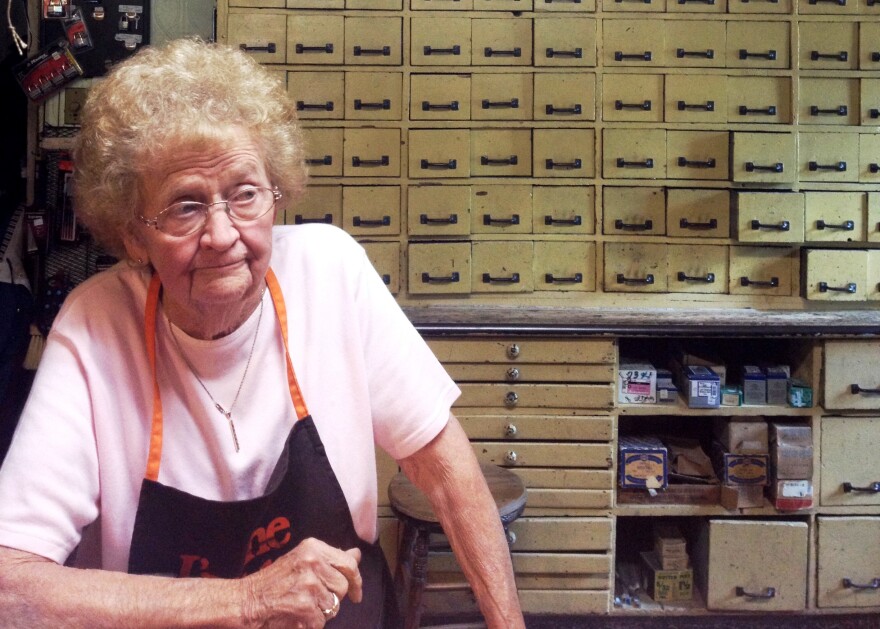Garrison Keillor has gentle fun with the people and folkways of rural Minnesota in his long-running radio show A Prairie Home Companion. Kalamazoo writer Chris Killian encountered the lives of the real people there during a recent stop in Sunburg, Minnesota.
I ended up in Sunburg, Minnesota because of a bumper sticker I saw while driving through the sugar beet fields of south-central Minnesota. It read: “Lutefisk is Legal in Sunburg,” a slogan too tasty not to look into.
Lutefisk, it turns out, is some sort of pungent, gelatinous fish dish popular in Nordic nations and only available Stateside during the holidays. Even here, where almost all of the 100 residents are of Nordic descent, where Norwegian is spoken alongside English, I couldn’t find it. But I did find Marsha Skindelien sitting on a patio chair outside a hardware store that shares her last name, chatting with an older man about nothing in particular, the small-town pastime, speaking with an accent at times barely discernable.
We walk inside the hardware store and the musty smell of ancient dust fills the air. Marsha wears a work apron, “The Problem Solver” scrolled across its front. She’s been here for 56 years, and even in this age of gargantuan home improvement retailers, the small shop charm she has is worth the drive for many folks.
“Well you know I have people coming in and they say you know we have been all over looking for this, looking for that and I figure this is an old hardware store and I’m sure you’ve got it.”
They’re probably right. The shelves are full of random items – a waffle iron, porcelain dolls, rat poison, wrapping paper, hearing aid batteries – even two molasses cookies randomly placed by the engine oil. Hanging from the tin ceiling are dust-covered pulleys and engine belts that look to have been placed there during the Clinton Administration.

Marsha shuffles down the main aisle, the baby blue paint worn away to reveal the concrete underneath, and takes her place behind a manual cash register from the 1920s, right next to a 80-year-old Toledo scale she uses for all weighted orders. The state checked it earlier this year. It was working perfectly. Behind her is a wall of 120 unmarked drawers, where she keeps nuts and bolts. I ask her if she knows what’s in them all, and she starts pointing and talking.
“This is a quarter inch machine...5/16...3/8...7/16...5/8... half- and a 3/4-inch bolts. And then you can start from the other end. This is all carriage bolts. And here it’s all flat washers, locks and nuts.”
A customer, the second of the day, comes out of the bright sunshine and into the store and is embraced by the mustiness as she seeks, and finds, a bag of birdseed.
Sunburg has only six streets. It is a town that holds on tight to its past where people hold even tighter onto each other. Although she has oodles of relatives in town, Marsha works the store by herself. Her husband passed away last October. It was their store and like so many shops that have lasted generations there is a story about how it almost never happened.
“My husband got out of the service and he wanted to be a carpenter so we went down to the cities (Minneapolis-St. Paul). (He) went to Dunwoody College and another college in St. Paul. He had to take a test and we never heard anything for a while. Then this hardware store came up for sale,so he said, ‘Maybe we should buy the store ‘cause I haven’t heard nothin’. Here in two weeks he got a letter that he’d passed his test and he could start. But we’d already bought the store, so here we are.”
Marsha knows she’s part of a dying breed: the small shop owner in a small town, the kind of place where she knows her customers’ birthdays and where people stop in to talk more than buy anything. What she doesn’t know is what will happen to the hardware store when she follows her husband. It’s been hard. She’s a tough lady but the store was in many ways an extension of their marriage; they had a mutual love for Sunburg, a fidelity to its farmers and homemakers.
“What was it like working with your husband?"
"Good. (Long pause) It’s a big change…but life has to go on.”
“I got the daughter at the bank up her working. I have a grandson and granddaughter. Now I’m gonna become great grandma again for the second time."
"It’s tough isn’t it?"
"Yep."
"This place is full of a lot of memories."
"Yep.”
Marsha gave me a grandma-sized hug before I left and told me, as grandmas do, to be safe and eat enough. The whole town seemed to come out bid farewell, ushering me out on a parade of smiles and waves. You never know what you’ll find if you don’t look.
Follow Chris Killian's journey across America at his blog.

